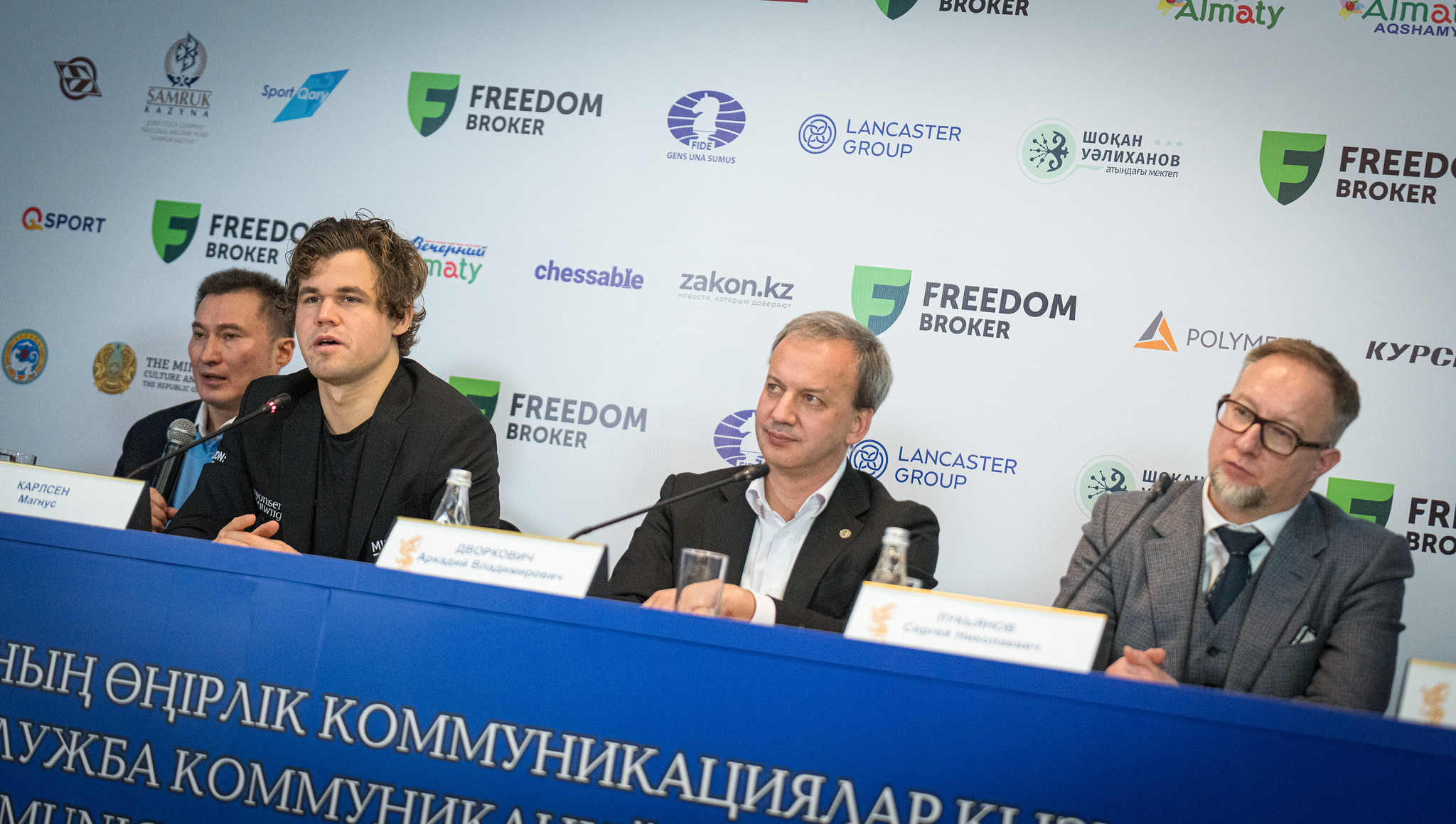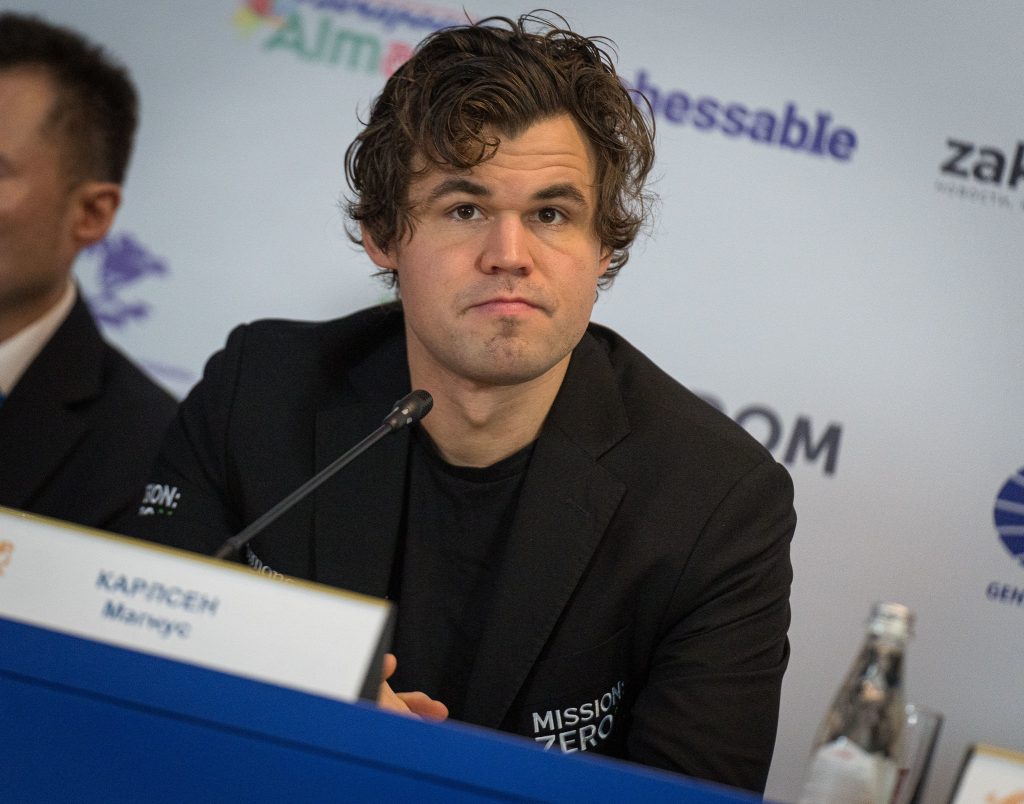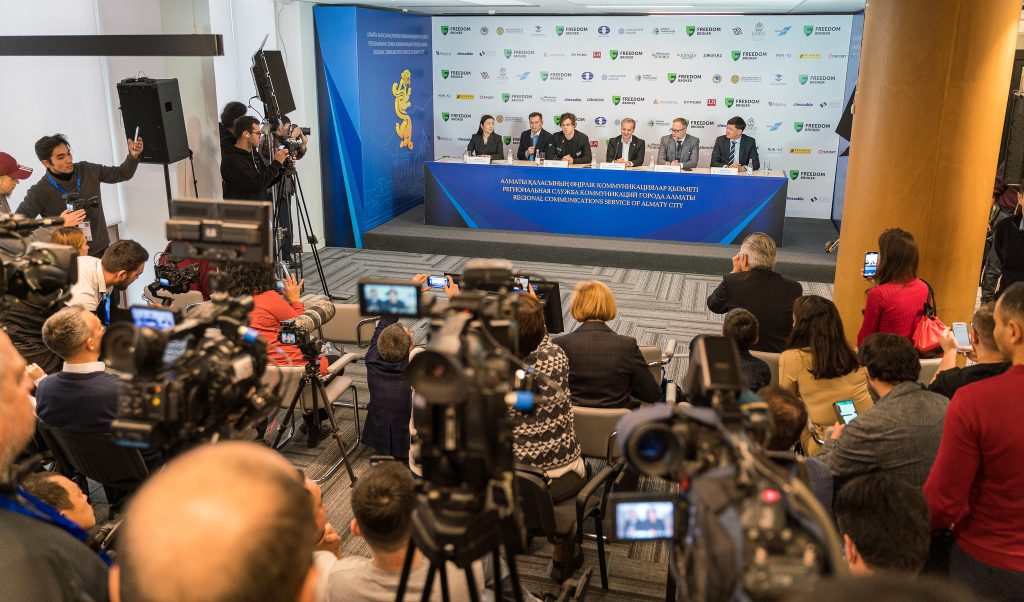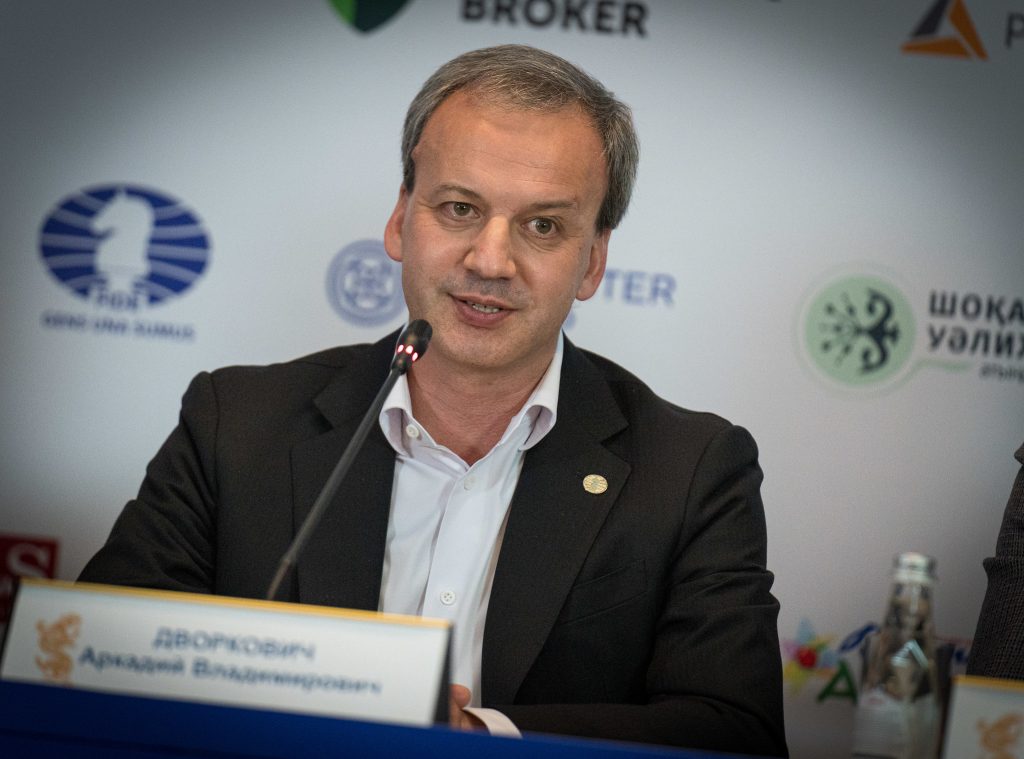FIDE World Rapid and Blitz 2022

In the first press conference of the World Rapid and Blitz, World Champion Magnus Carlsen and FIDE president Arkady Dvorkovich answered a broad set of questions from the media
The first press conference of the World Rapid and Blitz chess championships was held on 26th December at the Almaty telecentre, the official communications centre of the government of Kazakhstan.
The conference was attended by national and international media.
Present at the conference were Magnus Carlsen, five-time World Chess Champion, Arkady Dvorkovich, FIDE President, Dauren Abaev, Minister of Culture and Sports of Kazakhstan, Galim Khusainov, President of the Kazakhstan Chess Federation, Darmen Sadvakasov, Vice-President of the Kazakhstan Chess Federation, as well as Sergey Lukyanov, Chairman of the Management Board of Freedom Finance, main sponsor of the event.
Almost all of the questions were directed at Magnus Carlsen, five-time World Chess Champion.
Carlsen first complimented the organisers on the opening ceremony: “It was a good ceremony with a nice and clear message – welcome to Kazakhstan. Not only me but a lot of people felt welcomed.”
Here are the key quotes from Carlsen’s responses.

On his ambitions in Almaty
Magnus Carlsen was asked whether the fact that this is the last time he is appearing in the World Rapid and Blitz as the world champion in classical chess has any impact on how he approaches this event.
“These championships have been very important for me for a decade, and they will continue to be an event to enjoy and covering for. I am always on the hunt for more titles and wins, and that will not change in the future regardless of the classical championship.”
On playing Hans Niemann
Carlsen was also asked if he would play against Hans Niemann if the two were paired.
“I don’t have an answer. I understand it’s a question that people want an answer to, but I hope you can understand I can’t answer it.”
On the role of chess in improving mental health
Speaking about the recent rise in the popularity of chess, Carlsen noted the impact the coronavirus pandemic has had on forcing people to stay indoors, but he also pointed to the rising awareness of mental health and the role chess can play in improving it: “Across many societies, there’s an emphasis on having not only a healthy body and a healthy mind and chess is quite suitable.”

Carlsen was asked if chess players work with mental coaches. “I never felt the need. I feel like I usually understand the reasons for my successes and failures. I haven’t felt the need to speak to professionals. I have people in my life I can talk to about these matters”, said Carlsen.
“People who work with me work hard so I can work less and focus more on the games. I think about chess all the time – I visualise the games and think about the ways I can improve. There is not a lot of deliberate practice or something that people perceive as work. I never wanted a classic nine-to-five job, and I don’t think I can ever treat chess as this… I think my way goes to show that there are several ways to obtain a goal.”
On the biggest lesson chess taught him
The world champion was also asked what the biggest lesson chess is has taught him.
“Chess has taught me that spending a lot of time on chess will make you good at it. Everything is not necessarily transferable. The most helpful thing I learnt from chess is to make good decisions on incomplete data in a limited amount of time.”
On Kazakh chess players
There have been many good Kazakhstani players of the past, Carlsen noted.
“One of the early good victories was against Evgeniy Vladimirov, who was a very strong player in the 1980s and 1990s and notable as Kasparov’s coach… Zhansaya Abdumalik is one of the best female players in the world. There are some strong young players. For now, there has been more success for Uzbekistan, your neighbours, but I’m sure that’s motivating for the youngsters here.”
On shogi and other board games
“I am fascinated by other board games, especially the Japanese game shogi. As for go, I don’t know much about the game. I understand that it’s insanely complex. It’s more of a pure game than chess because the rules are simple and clear, and yet the game itself is so complicated. I’m used to playing chess, so I feel that it is more interesting because the pieces have different qualities. Chess has been around for a long time, and it’s still far from being figured out by us humans. It’s a wonderful game”.
How to become world champion?
The final question of the press conference was asked by a four-year-old. As usual, kids at that age ask questions which sound so simple but are very difficult.
The question: How to become a world champion?
Carlsen’s response? “Very easy, you just have to defeat the previous world champion!”
Arkady Dvorkovich: A new era for chess
Other questions at the press conference were directed at FIDE president Arkady Dvorkovich.

Dvorkovich praised Kazakhstan as the hosts and noted that FIDE “are always happy to come back” to this country.
“Kazakhstan chess federation is well positioned to host FIDE events. We rely on the continuous support of the government and the Kazakhstan Chess Federation”, said Dvorkovich.
Summarising the year behind, Dvorkovich noted that it was “one of the toughest and one of the most successful years for FIDE”.
“Interest in chess is growing online and over the board. We contributed to that by doing our best. It was unfortunate that we had to shift the Olympiad, but we were able to do it, and we had a record number of participants in Chennai. We also held more than ten official FIDE championships postponed due to the pandemic. Chess is back on track both online and over the board.”
Dvorkovich also announced more projects focused on schools and women’s chess.
“We are starting a new era of chess by bringing chess to schools all over the world. Kazakhstan is one of the examples where our friends are implementing a five-year roadmap to include chess in education.
Also, 2022 was a year of women’s chess – we organised more tournaments for women and included them in more roles, including management, coaching and arbiters. It’s a good start of the decade for women in chess.”
Text: Milan Dinic
Photo: Sergey Alekseenok and Lennart Ootes